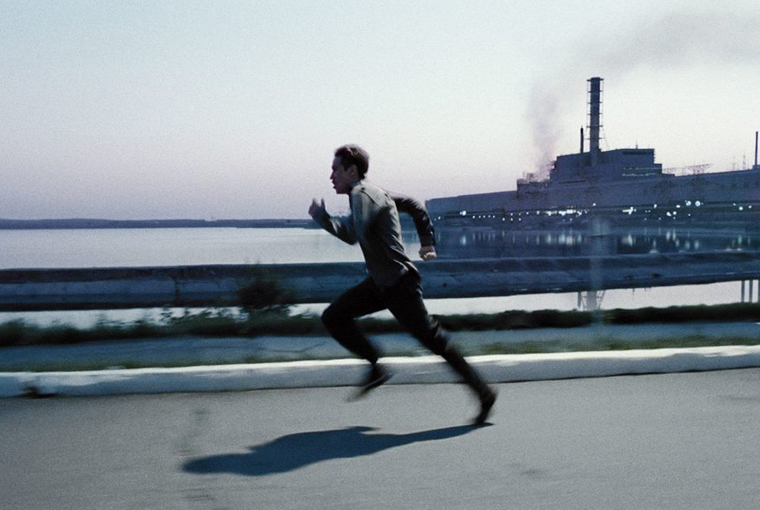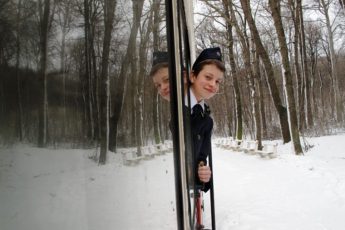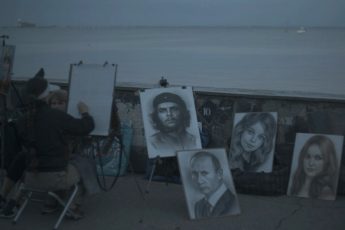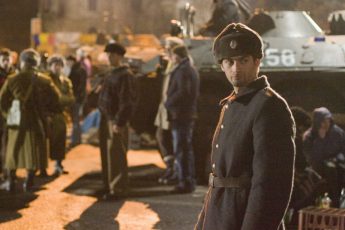The Denial of Truth
Alexander Mindadze’s Innocent Saturday (V Subbotu , 2011)
Vol. 6 (June 2011) by Konstanty Kuzma
On the 26th of April 1986, an explosion ocurred in the nuclear power plant in Chernobyl causing a damage that is still considered the biggest non-war nuclear catastrophe in the history of man-kind. Since then, Chernobyl has been used as rhetoric admonition for the risks of nuclear power. Alexander Mindadze’s Innocent Saturday starts off on this very Saturday, with the protagonist running through the night towards the high-reaching fire of the power station. Valerij- the protagonist – is involved in the plant and determined to find out what is happening, but the authorities present on the scene don’t want to have him there – along with lower-ranked workers they stand in a circle in a poorly-lit office and argue about the possible dangers of a catastrophe they are slowly becoming aware of. It is clear from the beginning that Innocent Saturday deals with the concept of denial, both on political and psychological grounds. In the beginning of the film, a burly character is introduced who sees the catastrophe as a chance to be promoted. But even Valerij himself shall soon give up his impeccable appearance for servile acceptance, gradually sinking into a state of conscious ignorance. Innocent Saturday does not speak about how people were left in the dark by a criminal system – the catastrophe only being officially announced 36 hours after the explosion. The denial as a political dimension is only a minor sub-plot to the film, a historical fact that is constitutive to the nature of the event. What really lies at the heart of the film is a psychological examination of the normal people that were willing to lie to themselves.
In Plato’s Allegory of the Cave from The Republic, a group of people are tied down in a cave, forced to watch the shadows of objects that are projected onto the walls surrounding them. Since they have been imprisoned since their childhood, they perceive shadows as actual objects. When one of the prisoners escapes his cuffs, he finds a way out of the cave and sees the real world and factual objects, realising that what he has known as reality is in fact a trick. However, it takes time to get used to the sun light, and the truth – there is an intermediary state in which the released prisoner struggles to accept the “new” reality, and it seems that Valerij is stuck in precisely this state with no hope of being able to “adjust” to it in the short post-catastrophic phase. Evidently, Valerij is facing another problem besides that of an inconvenient truth. Valerij is harming other people by not sharing his knowledge of the explosion and the acute danger of contamination. Still, this potential evilness is questioned by the fact that by denying the explosion, Valerij is also harming himself. Valerij wants to forget his knowledge about the plant, he wants to become a prisoner of untruth. Of course, from Plato’s perspective, Valerij fails by denying the catastrophe, because he acts out of convenience, but can we blame him?
The camera work in Innocent Saturday by Oleg Mutu (whose credits also include Cristian Mungiu’s 4 Months, 3 Weeks, 2 Days Sergei Loznitsa’s My Joy) works with hand-held shots throughout the piece, and particularly the hectic beginning generates a feeling of delirious disorientation. Mindadze does not want to give a definite answer to the question of Valierj’s motivations for denying the danger, his subtle deconstruction of the world depicted in Innocent Saturday leads to anarchy that ultimately devalues the logic of his characters. In Innocent Saturday, violence, sex, and passion are set free in the atmosphere of apocalypse. Maybe, this feeling of apocalypse shows us that Valerij knows that he has been contaminated while entering the plant after the explosion. While lying in the grass during his friend’s wedding party that takes place the same night as the catastrophe, his friend tells Valerij that his mouth tastes like metal after a brotherly kiss. In the end, it seems like there is no way around denial for Valerij. Maybe it is not the idea of normality, but the very existence of his world that Valerij is trying to save…




Leave a Comment